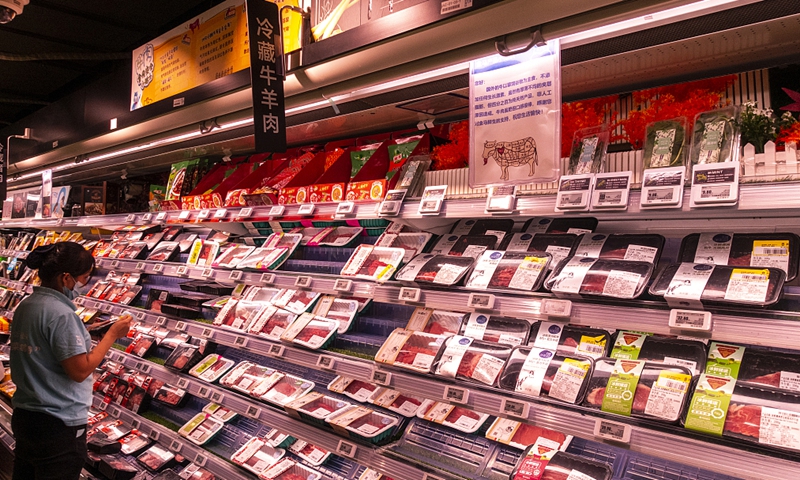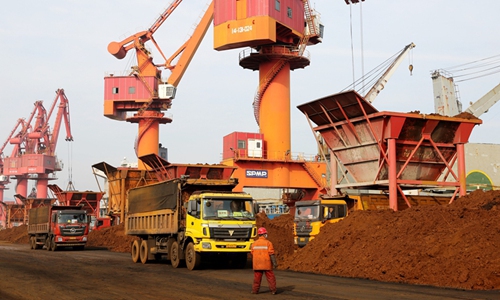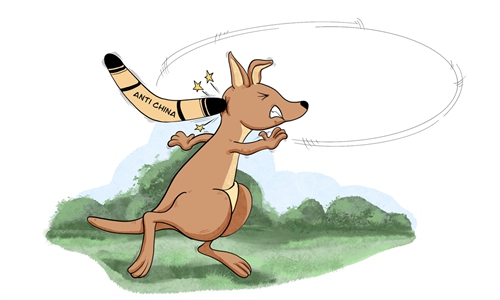COMMENTS / EXPERT ASSESSMENT
The US surpasses Australia in beef exports to China, what's next?

Imported beef is sold in a supermarket in Shanghai on August 20, 2020. Photo: VCG
Despite Washington's support to Canberra, it seems that the US did not hesitate to take over Australia's place as a leading beef exporter to China. Australia shipped more beef to China than the US until April. In May, the pattern reversed and the US sold $90 million of frozen beef to China, nearly twice the amount of Australia's sales, according to a report by the South China Morning Post citing Chinese customs data.
Australia shipped over $200 million worth of frozen beef to China in January 2020, over 20 times more than the US. Since then, the gap started to narrow down until it hit the cross point in May, and the trend has continued with growing shipments from the US while Australia's are decreasing, according to the report.
A similar trend has been seen in other sectors as well, such as Australian wine, timber and coal. Instead of confronting China or accusing China for an alleged "economic coercion", perhaps it is time for Canberra to discern the real role behind the US' campaign of "standing with Australia" against China.
By tying itself to the US' chariot, the Morrison administration has been deteriorating the relationship with its largest trading partner. In breach of international law and basic norms of international relations, Canberra has grossly interfered in China's domestic affairs, hurt Chinese interests and wantonly placed restrictions on bilateral exchanges and cooperation.
According to an industrial report issued by Australia-based Rural Bank, as an early supplier of frozen beef to China, it accounted for more than 50 percent of the market in 2013 before South American suppliers entered the market.
Australian beef exports to China peaked at almost 330,000 tones, worth A$2.7 billion ($1.96 billion) in 2019, the report said, noting that perhaps the most significant fact is that Australia has benefitted from a lack of competition from the US.
Australia and the US are major agricultural exporters across the world, with their products maintaining a leading position. What's crystal clear is that the US will not support Australia at the cost of its own interests. While boosting agriculture exports to China under the initial phase of the trade deal both sides signed in January 2020, the US did not forget to collect benefits from Australia's reckless efforts to accelerate tensions with China, which have been incited by the US.
Even though the Biden administration has attempted to lure its allies to form small cliques, its "America first" policy has not changed and the interest of its allies are not under its consideration.
Although exports of mineral resources have continued to boost Australia's performance, it cannot be ignored that more industries have suffered badly under Canberra's ill-advised strategy of jumping into the US chariot and confronting China.
In fact, Australia was one of the first countries banning China's Huawei with baseless "security risk" accusations and has been irrationally heightening scrutiny over China's investment. In August 2020, Chinese dairy behemoth Mengniu Dairy was forced to ditch a A$600 million acquisition deal to secure the Australian dairy brand Lion-Dairy & Drinks after Canberra said the business deal was "not in the national interest" of Australia.
Although Australia has launched as many as 106 anti-dumping and anti-subsidy investigations against Chinese products, China has only initiated four investigations against Australian goods.
China launched anti-dumping and countervailing investigations against imports from Australia in accordance with Chinese laws and WTO rules. Pulling a political stunt and hyping up the so-called "economic coercion" cannot help Australian industries. If Australian cannot redress its wrong strategy and genuinely take efforts to restore mutual trust and cooperation between the two sides, its beef exports to China may not recover.
The article was compiled based on an interview with Zhou Fangyin, Director of the Center for Pacific Island Countries Studies of the Guangdong University of Foreign Studies. bizopinion@globaltimes.com.cn



